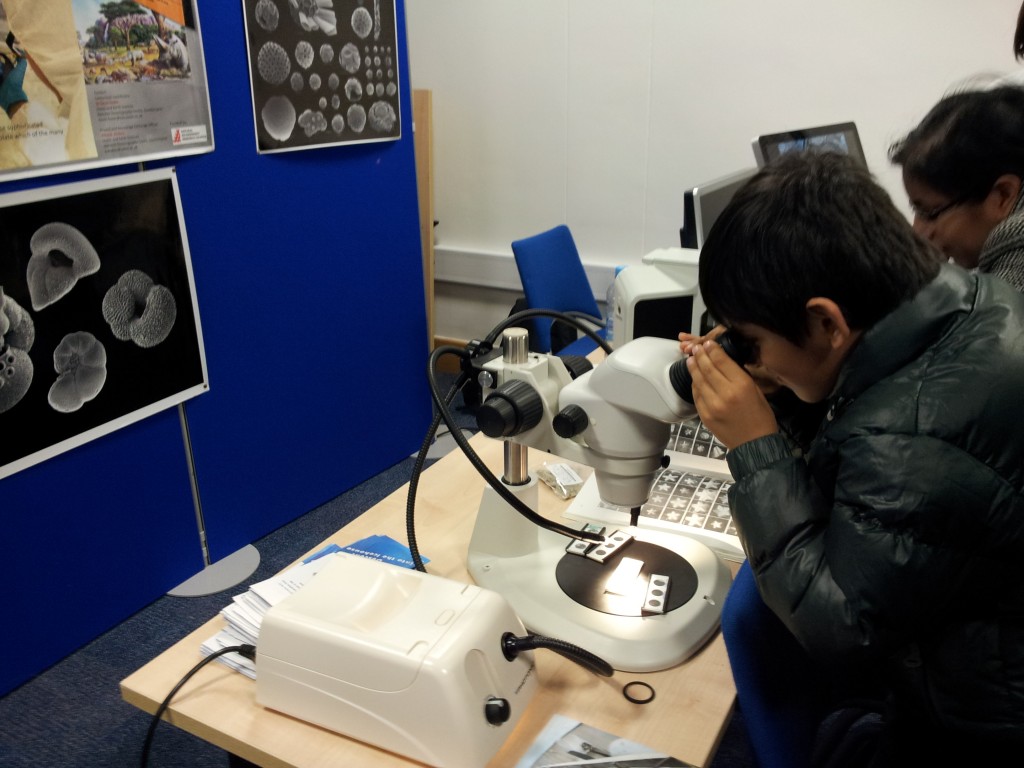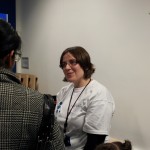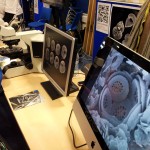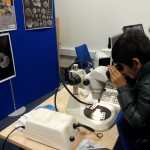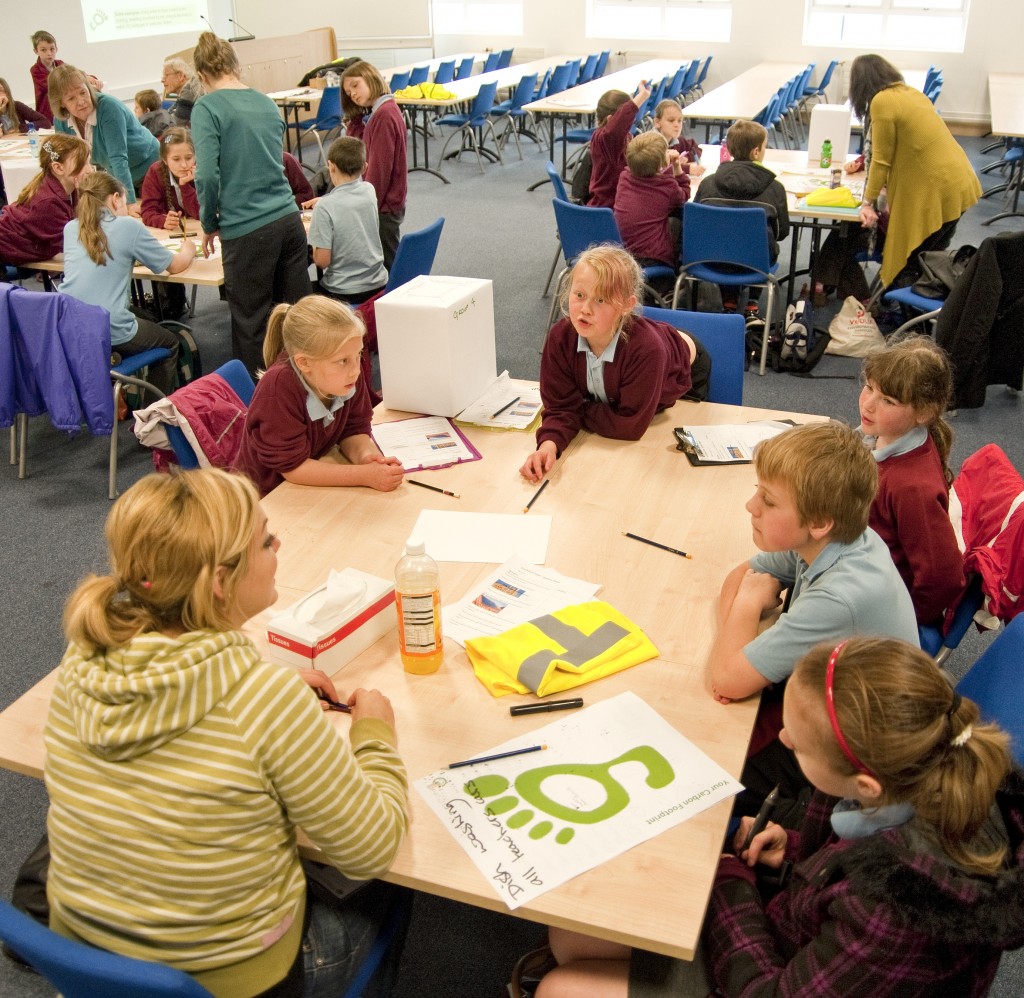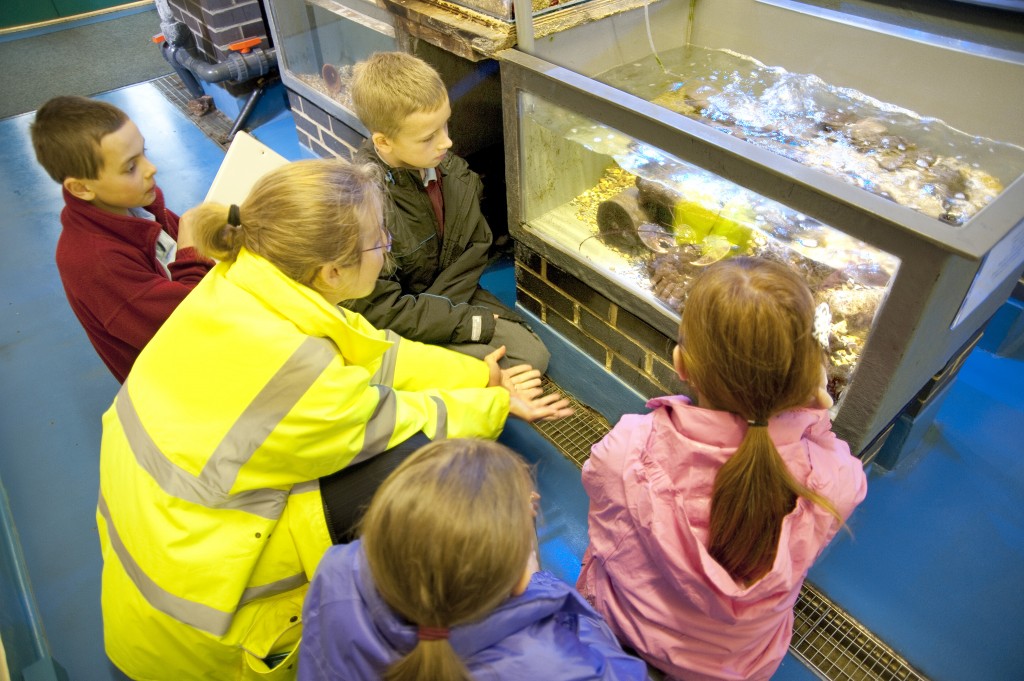A fantastic Ocean and Earth Day at National Oceanography Centre, Southampton
Another very successful Ocean and Earth Open Day held at NOC, Southampton on Saturday 23 March, 2013. A great turnout on a very cold day, we had over 3000 visitors and the feedback was extremely positive.
The Descent into the Icehouse (@IntotheIcehouse) participated in the event with a poster display and information material about our research work. We had a great attendance; our stand was full most of the time and it was a rewarding and exciting experience for both us and the visitors. It was fantastic to see the excitement in the children’s faces discovering through a microscope the tiny world of microfossils and especially those of foraminifera, a group of single-celled animals that construct shells of almost infinite variety and in most geographical regions.
The study of fossil foraminifera has many applications beyond expanding our knowledge of the evolution and diversity of life. Fossil foraminifera are useful in paleoecology, paleobiogeography, as well as, oil exploration.
The children and their parents had a great time exploring and discovering the wonders of nature and a whole world under the microscope.
- Eleni explaining the microscopic world
Our OED day would not happen without the help of our scientists and volunteers
Rosie Sheward Eleni Anagnostou Ioannis Komis Samantha Gibbs… and without their enthusiasm, dedication, determination and sheer hard work, this day could not be such a success. I’d like to take this opportunity to say again a very big THANK YOU.
More photos and a video will be made available from NOC online soon, so look out for another post in the next few weeks.
Eleni’s “Icehouse” class at Bowdoin College
A few days ago I had the opportunity to lead a discussion on the Descent into the Icehouse in Dr. Michéle LaVigne’s upper level undergraduate course, ‘Earth climate history’ at Bowdoin College (Brunswick, ME, USA). During the class, which was arranged as a video conference, the students discussed a selection of literature related to the Descent into the Icehouse project (Pearson et al. 2009, Bijl et al. 2009, Beerlingand Royer 2011).
We had a lively discussion and several issues have been raised, some of the most interesting ones were:
- The timescales of global climate change are very different between early Cenozoic and future predictions; how does understanding the Cenozoic help us predict the future?
- Ice caps seem to show a nonlinear response to climate forcing during melting due to a hysteresis effect, but will this hold true on current time scales? Could this response eventually manifest itself into hastened melting as opposed to persistence of ice caps?
- On early Cenozoic time scales, how much does the distance of the Earth’s orbit from the sun implicate atmospheric CO2 levels and how much of that theory is guesswork?
The most intriguing point to me was the question if the change in sea surface temperature was due to decline carbon dioxide concentrations, why/how did the tropics remain fairly stable during the Eocene? What are the possible mechanisms such as different ocean circulation, different atmospheric circulation, or something having to do with the uneven radiation from the sun based on latitude?
Well…. the answer to this question will have to wait until we have generated more data…
Overall, it was a great experience that I would certainly do again.
NOC hosts its first Eco-School visit. The Ludlow Juniors
On Thursday 10th May 2012, over 30 children from Ludlow Junior School visited NOC Southampton. This was the first Eco-School visit hosted by the Centre. Eco-Schools is a national programme run by Keep Britain Tidy.
The group had a packed morning starting with climate change briefing from Michael Henehan and a visit to the site Aquarium to learn about the potential of impacts of climate change on our local marine environment with Chris Sturdy.
The children also went on tour to see how NOC is managing its own carbon footprint with Lewis Rennison & Candy Snelling. This included a popular stop at the Waste Management Area to consider the ‘hidden’ carbon footprint of waste with Chris Bath, Cleaning and Recycling Supervisor.
Finally, the children completed activities that consider their own carbon footprint. The groups were given a helping hand by Southampton Environmental Sub Committee members Bob Whitmarsh and Kate Davis. Using what they learnt from the visit the children put together their own eco-school designs. These were reviewed by the NERC Environmental Management Group in July 2012.
The visit will help the school to progress on the Eco-Schools scheme. By supporting schools on this scheme, it is hoped more local children will become aware of NOC and the fantastic research that occurs at the Centre.
Want to get involved?
We have confirmed eco-school visits in October and November. If you think you can spare a couple of hours to help please email [email protected]
PhD opportunities at Southampton
PI Gavin Foster is advertising four NERC funded PhD projects this year. One in particular (Atmospheric CO2 during the Early Cenozoic) is directly related to this project.
Three other three topics available are:
(i) Boron isotopes in diatoms: a proxy for pH?
(ii) Assessing the magnitude of anthropogenic ocean acidification using boron isotopes;
(iii) Reconstructing the Greenland Ice Sheet in the middle Pliocene.
Funding is not guaranteed and is subject to interview. If you are interested please follow this link to find out how to apply.
Links
Follow us on Twitter
Recent Posts
- In the News : What a three-million year fossil record tells us about climate sensitivity
- Past evidence confirms recent IPCC estimates of climate sensitivity
- Crucial new information about how the ice ages came about : PR & Podcast
- 2014 Sino-UK Coevolution of Life and the Planet Summer School
- Past and Future CO2 – Reconstructing atmospheric Carbon Dioxide




